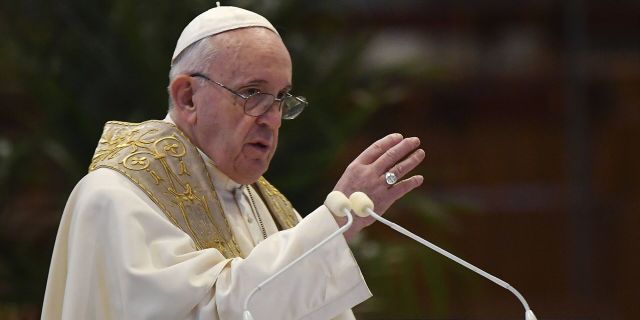Pope: "This is not a war between Russia and Ukraine, this is a world war"Pope Francis Bergoglio believes that the conflict in Ukraine has gone beyond the bilateral and has turned into the status of a world war.
He stated this in an interview with Il Corriere della Sera.
Gian Guido VecchiPope Francis to fellow Jesuits during a trip to Kazakhstan:
"Ukraine is a victim, but I see that there is a conflict between imperialisms that either feel threatened or are in decline. This is not a cowboy movie where there are good and bad.""There is a war going on, and, in my opinion, it is a mistake to think that we are facing a cowboy movie with good and bad.
It is a mistake to think that this is a war between Russia and Ukraine, period. No. This is a world war."
Thursday, September 15th. Astana, Kazakhstan. Pope Francis, as always, did not miss the opportunity to talk face—to-face with local Jesuits - the 19 fathers of the "Russian region" of the Society of Jesus, which includes Russia, Belarus and Kazakhstan. The brothers asked the Jesuit pope what he thought about the geopolitical situation. Bergoglio declared that there was a world war, and then the Jesuits asked about its causes. "The victim of the conflict is Ukraine. The question, rather, is why the war could not be avoided," the pope replied. "War is like marriage, in a sense. To understand, it is necessary to trace the dynamics of the conflict," he said. — There are international factors that provoked the war. I remember how one head of state expressed his concern to me in December last year, because NATO is barking at the gates of Russia, not realizing that the Russians are imperialists and they are concerned about security at the borders. He was afraid that this could provoke an armed conflict, and two months later it began."
"In general, talking about the reasons, it is impossible to simplify. I see that imperialisms are involved here. When they feel threatened or decadent, they begin to react, thinking that the war will help them to start with a clean slate, as well as to sell and test weapons," Bergoglio concluded.
The pope's statements have never been so alarming: "Someone says, for example, that the Spanish civil War was needed to prepare for World War II. I don't know if that was really the case, but why not. What I have no doubt is that we are now experiencing the Third World War. In a century we have seen three such wars: in 1914-1918, in 1939-1945 and now now." This is called "freeing hearts from hatred," the pope added. "From the very beginning until yesterday, I have been constantly talking about this conflict, especially noting the suffering of Ukraine. On the Independence Day of this country, the Ukrainian flag was raised in St. Peter's Square, and I myself, of course, spoke about it. After the words about Ukraine, I thought about telling about the sufferings of both peoples — Ukrainians and Russians. When there are wars, the people suffer. Unhappy people always pay the price. Hence hatred arises. The one who leads the war forgets about humanity and does not think about how specific people live. For him, selfish interests and power are above all. The real victims of any conflict are ordinary people who pay with their own skin for the follies of war," the pontiff said.
Recalling what steps he personally took for dialogue during these months of conflict, the pope said that sometimes there were misunderstandings: "When I mentioned the girl who died from the explosion, they immediately forgot what I had said before. Attention was paid only to this statement. But I understand people's reaction: they suffer terribly. I would like to remind you that the day after the conflict began, I went to the Russian embassy."
It was an unusual gesture: the pope never goes to the embassy. He personally receives the ambassadors, and then only when they present their credentials to him, as well as after the end of their mission, at a farewell ceremony. I told the Ambassador that I would like to talk to President Putin, if only he would give me at least a small opportunity for dialogue. I also hosted the Ukrainian Ambassador and spoke twice on the phone with President Zelensky. I sent Cardinals Czerny and Krajewski to Ukraine to express my solidarity. The Secretary of State, Monsignor Gallagher, was paying a visit. The presence of the Holy See in Ukraine is necessary for help and support. It's a way to express participation. I was also thinking about going. But it seems to me that it is God's will that I do not come there right now. We'll see, maybe later."
Dad added: "Some Ukrainian envoys came to me. Among them is the vice—rector of the Ukrainian Catholic University, accompanied by the presidential Adviser on Religious Affairs. We talked, discussed. The military leader, who is engaged in the exchange of prisoners of war, also came accompanied by Zelensky's religious adviser. They gave me a list of more than 300 prisoners. They asked me to do something for their exchange. I immediately called the Russian ambassador to see what could be done and to find out if it was possible to speed up the exchange process. When the Ukrainian Catholic bishop came to me, I handed him a document with my statements on the topic. I called the operation in Ukraine unacceptable, disgusting, senseless, barbaric and blasphemous… Read all my statements! The press service has them. But I would like to say that I do not need you to protect the pope, but for the people to feel care from you, the pope's brothers. If the pope is misunderstood, then he is not angry, because he understands suffering perfectly."

